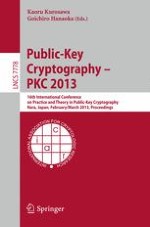2013 | OriginalPaper | Buchkapitel
Cryptography Using Captcha Puzzles
verfasst von : Abishek Kumarasubramanian, Rafail Ostrovsky, Omkant Pandey, Akshay Wadia
Erschienen in: Public-Key Cryptography – PKC 2013
Verlag: Springer Berlin Heidelberg
Aktivieren Sie unsere intelligente Suche, um passende Fachinhalte oder Patente zu finden.
Wählen Sie Textabschnitte aus um mit Künstlicher Intelligenz passenden Patente zu finden. powered by
Markieren Sie Textabschnitte, um KI-gestützt weitere passende Inhalte zu finden. powered by
A
Captcha
is a puzzle that is easy for humans but hard to solve for computers. A formal framework, modelling
Captcha
puzzles (as hard AI problems), was introduced by Ahn, Blum, Hopper, and Langford ([1], Eurocrypt 2003). Despite their attractive features and wide adoption in practice, the use of
Captcha
puzzles for general cryptographic applications has been limited.
In this work, we explore various ways to formally model
Captcha
puzzles and their human component and explore new applications for
Captcha
. We show that by defining
Captcha
with additional (strong but realistic) properties, it is possible to broaden
Captcha
applicability, including using it to learning a machine’s “secret internal state.” To facilitate this, we introduce the notion of an human-extractable
Captcha
, which we believe may be of independent interest. We show that this type of
Captcha
yields a
constant round
protocol for
fully
concurrent non-malleable zero-knowledge. To enable this we also define and construct a
Captcha
-based commitment scheme which admits “straight line” extraction. We also explore
Captcha
definitions in the setting of Universal Composability (UC). We show that there are two (incomparable) ways to model
Captcha
within the UC framework that lead to different results. In particular, we show that in the so called
indirect access model
, for every polynomial time functionality
$\ensuremath{\mathcal{F}}$
there exists a protocol that UC-realizes
$\ensuremath{\mathcal{F}}$
using human-extractable
Captcha
, while for the so-called
direct access model
, UC is impossible, even with the help of human-extractable
Captcha
.
The security of our constructions using human-extractable
Captcha
is proven against the (standard) class of all polynomial time adversaries. In contrast, most previous works guarantee security only against a very limited class of adversaries, called the
conservative
adversaries.
